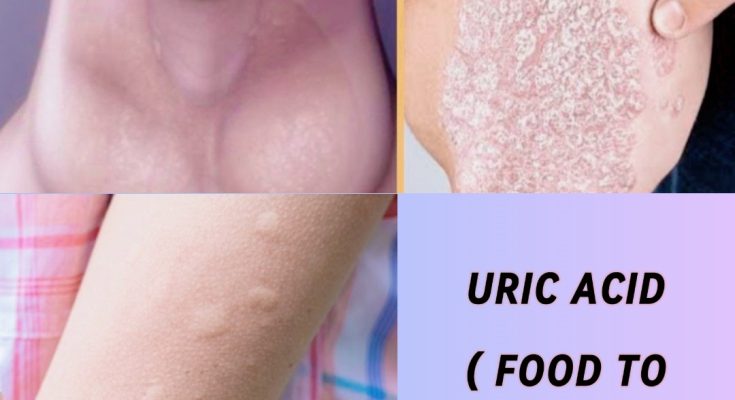Uric acid is a natural waste product created when your body breaks down purines, which are compounds found naturally in your body and in many foods.1 Normally, uric acid dissolves in your blood, passes through your kidneys, and is eliminated in your urine.2 However, if your body produces too much uric acid or your kidneys don’t excrete enough of it, it can build up in your blood, a condition called hyperuricemia.3 This can lead to health issues like gout (a painful form of arthritis) and kidney stones.

Here’s a breakdown of foods to avoid and common causes of high uric acid
Foods to Avoid (High in Purines or Fructose
To help manage uric acid levels, it’s generally recommended to limit or avoid foods high in purines and fructose:
High-Purine Foods:
- Organ and glandular meats: Liver, kidney, sweetbreads, heart, tongue.5 These are among the highest in purine content.
- Red meats: Beef, lamb, pork, venison.6 Limit serving sizes.
- Certain seafood and shellfish: Anchovies, sardines, herring, mackerel, mussels, scallops, trout, haddock, lobster, crab, shrimp, oysters, fish roe, caviar.7
- Game meats: Goose, veal.8
- Yeast and yeast extracts: Found in items like Marmite, Bovril, some gravies, and processed foods.9
- Meat-based gravies and sauces.10
High-Fructose Foods and Sugary Beverages:
- Sugary drinks: Sodas, fruit juices (even 100% fruit juice, as the fructose is concentrated), energy drinks, sports drinks, sweetened coffee drinks.
- Foods with high-fructose corn syrup: Many processed foods like baked goods, breakfast cereals, candy, ice cream, some frozen meals, and fast food.11 Check food labels.
- Excessive natural fructose: While whole fruits are generally healthy, excessive intake of fruits particularly high in fructose like apples, pears, mangoes, figs, watermelon, and dried fruit might be something to monitor if you are highly sensitive.12 Fruit juice is a bigger concern than whole fruit due to the concentrated fructose and lack of fiber.
- Honey: High in fructose.13
Alcohol:
- Beer: Especially problematic as it contains both purines and alcohol, which can impede uric acid excretion.
- Spirits (hard liquor): Can also increase uric acid levels.14
- Wine: Generally considered less impactful than beer or spirits, but moderation is still advised. Avoid alcohol altogether during gout attacks.
Other Foods to Limit/Be Mindful Of:
- Processed foods: Often contain unhealthy fats, sugars, and can contribute to weight gain.15
- Refined carbohydrates: White bread, pastries, sugary cereals, and other processed carbs can lead to blood sugar spikes, which are linked to higher uric acid levels.16
- High-fat dairy products: Some sources suggest limiting these, while low-fat dairy is often recommended as beneficial
Causes of High Uric Aci
High uric acid levels can result from the body producing too much uric acid, not getting rid of enough of it, or both.17 Common causes include:
- Dietary Factors: As mentioned above, a diet rich in purines, high-fructose corn syrup, and excessive alcohol consumption can significantly contribute to high uric acid.
- Kidney Problems: Impaired kidney function can reduce the body’s ability to excrete uric acid effectively, leading to its accumulation.18
- Obesity/Excess Body Weight: Being overweight or obese is a significant risk factor for hyperuricemia and gout.19
- Genetics: A family history of gout or hyperuricemia increases your likelihood of developing the condition.20
- Certain Medications:
- Diuretics (“water pills”):21 Used for high blood pressure and fluid retention.
- Immune-suppressing drugs.22
- Aspirin (in some doses) and other salicylates.
- Niacin (Vitamin B-3).
- Medical Conditions:
- Metabolic Syndrome: A cluster of conditions including high blood pressure, high blood sugar, excess body fat around the waist, and abnormal cholesterol levels.23
- High blood pressure (hypertension).24
- Diabetes.25
- Hypothyroidism (underactive thyroid).26
- Psoriasis: Rapid turnover of skin cells can increase purine breakdown.27
- Certain cancers or chemotherapy: Conditions like leukemia or tumor lysis syndrome can cause rapid cell breakdown, releasing large amounts of purines.28
- Dehydration: Insufficient fluid intake can lead to higher concentrations of uric acid in the blood.29
- Vigorous exercise: Can temporarily increase uric acid levels.30
Important Note: While diet plays a crucial role in managing uric acid levels, it’s often not the sole factor.31 For many individuals with high uric acid or gout, dietary changes alone are not enough, and medication may be necessary to effectively control levels and prevent flares.32 It’s always best to consult with a healthcare professional or a registered dietitian for personalized advice and treatment.


